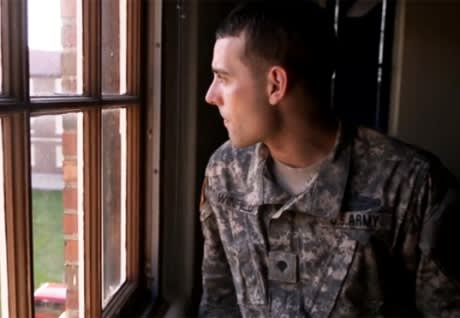In 2010, enthused American patriot—and underweight teenager—Adam Winfield eagerly enlisted in the U.S. Army, excited to uphold the honour and integrity of defending one's nation that his father, who also served in the military, did decades prior. As outlined in Dan Krauss's wholly engaging and exceedingly tense, yet traditionally structured, documentary, The Kill Team, he was desperate to prove himself, which concerned his parents who wanted to hold him back but also didn't want to stunt or impose on his life trajectory and identity.
A year later, Winfield returned to the U.S. a suspected war criminal, accused of murdering innocent Afghani civilians for sport as part of the titular American "kill team." "How" and "why" are questions smartly left for the climax, first being contextualized by the systemic behaviours and attitudes of those within Winfield's troop, some of whom are interviewed, quite candidly throughout this riveting work.
Early on, two of the accused soldiers describe their experience in Afghanistan as "boring," noting that action at gunfire was their reason for enlisting. Their unapologetic perspective, growing wide-eyed and enthused when describing armed combat with helicopters flying overhead and bullets flying, suggests a youthful addiction to a glamorized idea of action and a lack of coherence about the nature of mortality.
As such, the eventual re-creation of events through interviews, Facebook chats, backroom court footage and psychological profiling doesn't surprise in its gradual revelation of distorted reality within the vacuum of the superego power structures that the Army allows in young men. Descriptions of bullying and ritualistic modes of abject bonding as juxtaposed with the genuine terror of Winfield—and the eventual whistleblower, Justin Stoner, whose decision to do the right thing may negatively affect his entire life—pleading to his parents to help him get out of a dangerous situation.
Amidst these distressing descriptions and identifiable feelings of isolation, with Winfield being forced to assimilate to an insane status quo for self-preservation, are some extremely disturbing photographs and video snapshots of the kill team enacting their murders. Making this more palatable are the interviews with Winfield's parents who ground the film with a bit of heart, vocalizing the sort of disappointment and rage those outside of the situation feel.
Beyond the sheer intrigue of the very disturbing story itself are the implications made about the military ideology. What does it mean that such behaviour in soldiers, men attracted to power and conflict, isn't much of a surprise? And what sort of infrastructure have we collectively allowed to exist that punishes victims and threatens those that speak out against issues as black and white as murder?
These bigger questions obviously can't be answered but Krauss smartly raises them as food for thought while detailing a real life horror story.
(f/8 Filmworks)A year later, Winfield returned to the U.S. a suspected war criminal, accused of murdering innocent Afghani civilians for sport as part of the titular American "kill team." "How" and "why" are questions smartly left for the climax, first being contextualized by the systemic behaviours and attitudes of those within Winfield's troop, some of whom are interviewed, quite candidly throughout this riveting work.
Early on, two of the accused soldiers describe their experience in Afghanistan as "boring," noting that action at gunfire was their reason for enlisting. Their unapologetic perspective, growing wide-eyed and enthused when describing armed combat with helicopters flying overhead and bullets flying, suggests a youthful addiction to a glamorized idea of action and a lack of coherence about the nature of mortality.
As such, the eventual re-creation of events through interviews, Facebook chats, backroom court footage and psychological profiling doesn't surprise in its gradual revelation of distorted reality within the vacuum of the superego power structures that the Army allows in young men. Descriptions of bullying and ritualistic modes of abject bonding as juxtaposed with the genuine terror of Winfield—and the eventual whistleblower, Justin Stoner, whose decision to do the right thing may negatively affect his entire life—pleading to his parents to help him get out of a dangerous situation.
Amidst these distressing descriptions and identifiable feelings of isolation, with Winfield being forced to assimilate to an insane status quo for self-preservation, are some extremely disturbing photographs and video snapshots of the kill team enacting their murders. Making this more palatable are the interviews with Winfield's parents who ground the film with a bit of heart, vocalizing the sort of disappointment and rage those outside of the situation feel.
Beyond the sheer intrigue of the very disturbing story itself are the implications made about the military ideology. What does it mean that such behaviour in soldiers, men attracted to power and conflict, isn't much of a surprise? And what sort of infrastructure have we collectively allowed to exist that punishes victims and threatens those that speak out against issues as black and white as murder?
These bigger questions obviously can't be answered but Krauss smartly raises them as food for thought while detailing a real life horror story.




